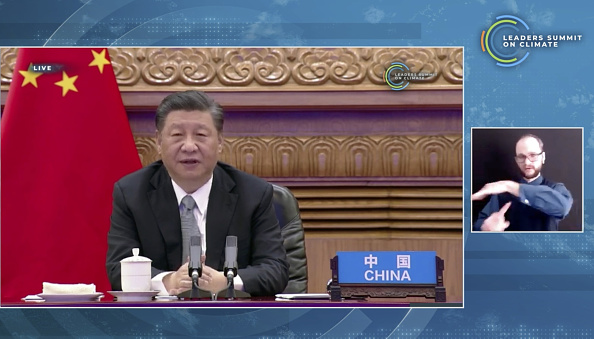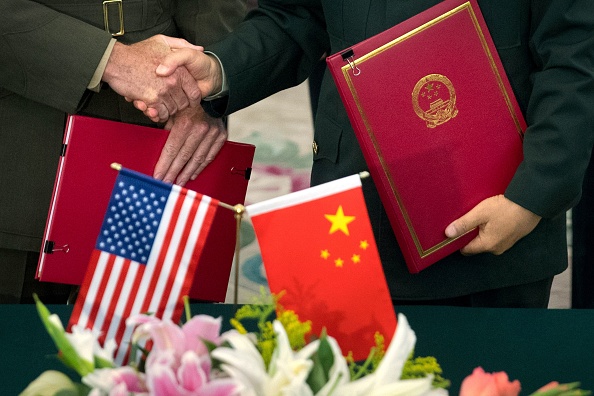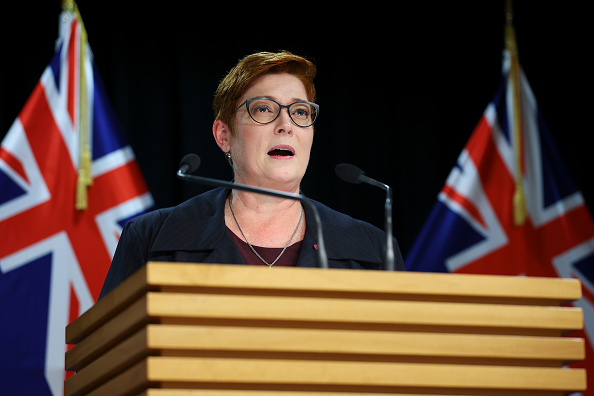
 Carbon Cutting
Carbon CuttingThis week saw the first meeting between the leaders of China and the United States since the inauguration of President Joe Biden, when President Biden hosted a two-day virtual climate summit attended by President Xi Jinping and other global leaders to discuss how to tackle climate change as a united front. Biden opened the summit pledging that the U.S. would cut its carbon emissions in half by the end of the decade, and noted that the U.S. is "really beginning to make some real progress."
President Xi Jinping was the first national leader to speak after Biden, emphasizing in his five-minute address the need for the global community to "be committed to multilateralism," while noting that China "looks forward to working with the international community, including the United States, to advance global environmental governance." Xi also pledged that China would work to "strictly control coal-fired power generation projects," and limit its coal consumption over the next five years. He also repeated China's 2020 commitment to reduce carbon emissions to net zero by 2060. China is the world's largest coal consumer and is currently the world's largest emissions emitter, with the U.S. following close behind.
The summit followed a meeting between U.S. special envoy for climate John Kerry and his Chinese counterpart Xie Zhenhua in Shanghai last week. The two released a joint statement on Sunday saying that the U.S. and China should cooperate on fighting the climate crisis with "seriousness and urgency." For more, read Climate Governance: Setting the Stage from Tang Xinhua, Deputy Director of the Center for Climate Change and Ecological Security Studies.
 Strategic Competition
Strategic CompetitionThe U.S. Senate pushed forward efforts to pass the Strategic Competition Act, a bipartisan bill focusing on economic and scientific competition with China, as well as human rights. The bill passed through the Senate Foreign Relations Committee on a 21-2 vote, and now includes an amendment for U.S. officials—not athletes— to boycott the 2022 Beijing Olympics. The bill, written by Democratic Senator Bob Menendez and Republican Senator Jim Risch, is now set for a vote in the Senate, where it is expected to pass, before going to the House and then ultimately to President Biden's desk for signature. The bill is likely to become law, as it has strong bipartisan support in Congress and is supported by the Biden Administration.
In response, Chinese Foreign Ministry spokesperson Wang Wenbin said the legislation "distorts the facts and confuses right and wrong," and that the U.S. lawmakers' efforts were based on Cold War-era mentalities.
While momentum grows on the Senate floor, ambassador picks from both China and the U.S. to each other's capitals are poised to happen soon. Beijing is expected to name Qin Gang, who served as President Xi's chief protocol officer, as Ambassador to the U.S., while Washington is likely to appoint seasoned diplomat Nicholas Burns as Ambassador to China.
 Trouble Down Under
Trouble Down UnderThe Australian government announced it would cancel two infrastructure agreements between China and the Australian state of Victoria, overriding decisions made in 2018 and 2019. Australian Foreign Minister Marise Payne called the deals "inconsistent with Australia's foreign policy or adverse to our foreign relations" but noted the decision is "not aimed at any one country." Agreements made with Iran and Syria over education and technology were also revoked.
In response, Chinese Foreign Ministry spokesperson Wang Wenbin warned Australia to avoid traveling "further down the wrong path to avoid making the already strained China-Australia relations worse." China and Australia have had a strained relationship in past years, with China threatening billions in tariffs within the past year alone. At a daily briefing, U.S. State Department spokesman Ned Price said "we continue to stand with the people of Australia as they bear the brunt of the PRC's coercive behavior."
Prepared by China-US Focus editorial teams in Hong Kong and New York, this weekly newsletter offers you snap shots of latest trends and developments emerging from China every week, while adding a dose of historical perspective.
- 2021-04-16 A Hopeful Climate
- 2021-04-09 Technological Frontiers
- 2021-04-02 Back to Basics
- 2021-03-26 The Biden Era
- 2021-03-19 “A Strong Smell of Gunpowder and Drama”
- 2021-03-12 Bridging the Divide
- 2021-03-05 A Tale of Two AI Superpowers
- 2021-02-26 Changing of the Guard
- 2021-02-20 Collective Approaches
- 2021-02-13 Hopes for a Bullish Year
- 2021-02-05 “The Most Serious Competitor”
- 2021-01-29 Looking Towards Multilateralism
- 2021-01-22 Biden’s China Path
- 2021-01-16 Becoming a "Technological Superpower"
- 2021-01-08 Capital Chaos
- 2020-12-18 All Eyes on 2021
- 2020-12-12 Midwest to Middle Kingdom?
- 2020-12-04 Shifting Winds